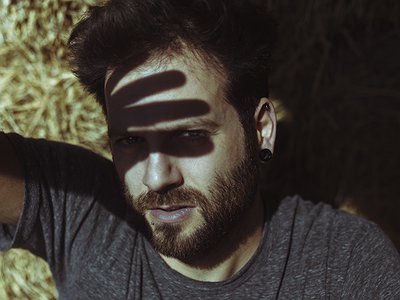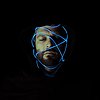Could you take us through a day in your life, from a possible morning routine through to your work? Do you have a fixed schedule? How do music and other aspects of your life feed back into each other - do you separate them or instead try to make them blend seamlessly?
Music is my life, and it interacts with every aspect of it on a daily basis.
During week days, when I don't generally have gigs, I wake up around 9am, always stretch for 5 minutes and then make breakfast. I try to stay healthy and usually make a shake with wholemeal oats, rice milk and fruit. After that, I head to the studio where I’ll spend most of the day composing, mixing, listening to promos, emails and work. When I am in an intense studio session I don't stop for lunch and rarely have a break (which I know isn’t good for me, but sometimes you are in a flow and it’s better and more productive to just keep going). Around 8pm I am then starving, so I have a shower to refresh and then make dinner and usually listen to what I did in the studio. Last but not least, I watch a movie, or a documentary, sometimes read a book if I have something I am into, before collapsing in bed to start all over again the next day.
The weekends are always different. I am always at a show, so that means a late finish and I try to always get a later flight, so I can lie in bed and catch up on rest until about 1pm. I leave the hotel and always eat at the airport, but the meals are generally shitty - I should learn to make the most of hotel breakfasts! [laughs] Once I land at my next destination, it’s straight to the hotel where I spend the rest of the day. There's usually a little rest and then I can prep for the show, and also listen to promos. Again, when I have a really heavy schedule, I never get to even see the cities I am visiting, which is a shame, but that's part of the job and work is more important. Usually I get to the venue around 1am, and get hyped for my set, check out the crowd and set up in the booth, whilst chatting to people at the club. And I like to always listen to the DJs playing before me, too. Bedtime is always late. I never know what time it will be, as sometimes I stay at the party longer than intended!
Could you describe your creative process on the basis of a piece or album that's particularly dear to you, please? Where did the ideas come from, how were they transformed in your mind, what did you start with and how do you refine these beginnings into the finished work of art?
After focusing mainly on peak time tracks releases as singles, about two years ago I started to feel the need and desire to explore myself and tell a little more about my story, narrated with music. The concept for the album grew as I have always been curious about evolution, the human relationship with nature and our biological history. I found the fundamentals and started to look into how to explore and tell this story with the help of music.
The composition took place at the same time as the research, as its sound interpretation, to form both a written and sound conceptual path was interpreted through machines.
There are many descriptions of the ideal state of mind for being creative. What is it like for you? What supports this ideal state of mind and what are distractions? Are there strategies to enter into this state more easily?
Feeling full of physical, mental and spiritual energies is the best mental state to create, because you are more open and more receptive. You can hear what you want and extract it from all the background noise. This mental state is facilitated by a psychophysical balance and it is penalized by stress and lack of rest. So make sure you sleep and look after your mind, body and soul.
How is playing live and writing music in the studio connected? What do you achieve and draw from each experience personally? How do you see the relationship between improvisation and composition in this regard?
Playing and composing in the studio are two completley contrasting things. However, they influence each other more than you think. When my schedule is filled with gigs I seem to have some of my best performances. I think this is because when I am always focused on playing at shows rather than worring about time in the studio, I get into the flow. Anyone can probably tell you it‘s hard to switch between the two regularly. I feel the need to have longer periods of time in the studio, with no breaks for gigs or travel. The peaks of my creativity are at their highest on the weekends when I am home, due to consecutive days of studio time. The brain, day after day optimizes its ability to help you on what you are doing.
How do you see the relationship between the 'sound' aspects of music and the 'composition' aspects? How do you work with sound and timbre to meet certain production ideas and in which way can certain sounds already take on compositional qualities?
Their relationship is unavoidable. Every single sound can express itself better through certain notes or a certain writing, depending on its features. I work a lot on sound design to meet my production ideas, but it's not always necessary. If I feel the need for a certain frequency in the spectrum to be covered, I usually go for a simple sound. While if I compose a melodic riff or a rhythmic pattern that play a key role in my production, then I tweak the knobs and sound design until I get the best result obtainable by those compositional characteristics.
Another case can be a single, well designed sound that interacts with the rest of the arrangement creating a “question-answer” game. For many years, I've developed my own natural way to shape sounds and to give them space, giving them a spontaneous signature. At least this is what my friends tell me. [laughs]
Our sense of hearing shares intriguing connections to other senses. From your experience, what are some of the most inspiring overlaps between different senses - and what do they tell us about the way our senses work? What happens to sound at its outermost borders?
The best overlap in my opinion is hearing + touch + sight. When the lower frequencies of the audio spectrum cross the sound border and trigger your body through deep vibrations (mechanoreception), at the same time inducing geometric waves on water, allowing you to actually see the sound.
Art can be a purpose in its own right, but it can also directly feed back into everyday life, take on a social and political role and lead to more engagement. Can you describe your approach to art and being an artist?
I've have endless passion for sound and music. I feel I am sensitive to vibrations, I gave my life for them and I cannot think about myself without it. I convert my experiences into music and at the same time, I get inspired by music to make new experiences. I live life, thanks to the music and I try to give to the music my contribution to let it evolve and live forever.
I feel I have a big responsibility for what I do. But I don't feel like I am an artist. I think it's so complex to say what an artist is or is not. If anyone who is creative can be an artist, then there are a lot of them around today! Who can tell you that you're an artist? I don't know. Are we sure that booking agencies are all filled up by artists? And that every single name displayed on Beatport represents an artist? Am I even making art?
I think that art becomes ‘art’ after you can see the impact or the effect taking place on society. Sometimes it takes seconds, sometimes centuries, sometimes it never happens. Art is what people think is art. And I don't feel as though I'm in a position to tell you ...
My music comes from deep inside, and it's a complete representation of myself, which in turn, could be defined as ‘Art’. [laughs]
It is remarkable, in a way, that we have arrived in the 21st century with the basic concept of music still intact. Do you have a vision of music, an idea of what music could be beyond its current form?
I think music will always be what it is. But it will be influenced by how musicians will evolve their approach to producing sounds and noises in space and time.



